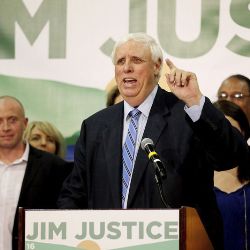West Virginia Becomes Sixth State to Legalize Sports Betting

Last week, West Virginia became the latest US state to legalize sports betting after Governor Jim Justice (photo) failed to add his signature to Senate Bill 451 after five days, meaning that it then automatically passed into law. West Virginia now becomes the sixth state to pass a sports betting bill, with the others being Connecticut, Mississippi, New Jersey, New York, and Pennsylvania.
However, the state must still await a positive ruling from the US Supreme Court in the New Jersey sports betting case before launching its market, with a decision expected as early as next month.
Senate Bill 451
After a year of research by the Lottery Commission, SB 451 was introduced to the Legislature on February 1st, before taking less than six weeks to sail past both the House and Senate.
According to the details of the bill, West Virginia’s five casinos and racinos will be permitted to offer sports betting under the oversight of the Lottery, with a $100,000 fee charged for each license. Other particulars of the law includes a minimum wagering age of 21, with bets allowed to be placed on both pro and collegiate sporting events via online and mobile devices.
Sports Leagues Wanted In
West Virginia will earn 10% of all gross receipts, and has forecast that a legalized sports betting market will result in tax revenues in excess of $5 million for the state in its first year of operation.
Interestingly, the NBA and MLB only offered their support for the efforts of West Virginia and other states to legalize sport betting only if a proviso was included in which they would receive a 1% “royalty fee” on all the money wagered. The two sports leagues subsequently claimed that the money could then be used to help ensure the “integrity” of its games, and allow them to monitor the industry better.
Nevertheless, the huge amount of money that they would have received under such an agreement was viewed as a money grab by state lawmakers, and as a result their demands failed to gain any support in either organ of the West Virginia legislature. Consequently, no such provision has been included in SB 451, ensuring the leagues continued opposition to legalized sports betting throughout the country, and any attempt by the US Supreme Court to overturn the Professional and Amateur Sports Protection Act (PASPA).
Still Hope of Integrity Fee
That said, Governor Jim Justice has still given the sports league hope that they may still receive a cut of the money via an integrity fee. After allowing SB 451 to pass into law, Justice said that pending a positive ruling by the Supreme Court that he would “ask the Legislature to look at the advantages of partnering with the major sports leagues.”
Justice said that he not only believed that there would be real value attached to such a partnership, but that this approach would allow the state to develop healthy relationship with all the country’s major sports leagues. The NBA and MLB subsequently responded positively to the Governor’s proposal, with MLB stating:
“Major League Baseball appreciates the willingness of Governor Justice to correct the significant flaws in the sports betting statue by calling a special session to amend the law. We believe that with the Governor’s leadership, the amended statute will better protect the citizens of West Virginia and the integrity of sports, and also increase revenue for the state in the long run.”
Awaiting SCOTUS Ruling
Despite all the legal mobilization by individual states, it will all have been in vain unless the Supreme Court of the United States (SCOTUS) decides to overturn the federal law currently preventing all states from offering sports betting, with the exception of Nevada, Montana, Oregon, and Delaware. Interestingly, in 2017 Nevada recorded its best year to date after its sports betting handle reached a massive $247.8 million.
Around five years ago, New Jersey Gov. Chris Christie attempted to circumvent the federal law known as the Professional and Amateur Sports Protection Act (1992) by legalizing sports betting in his state. He soon found himself being sued by major sports leagues as a result, including the likes of the NCAA, NFL, NBA, NHL and MLB, with the long legal process that followed now on the brink of reaching its imminent conclusion.
According to experts, the Supreme Court will likely rule in favor of New Jersey, and a landmark reversal of the PASPA law, which seems to be borne out by the fact the MLB and NBA are currently so occupied talking to lawmakers from different states, and trying to secure a slice of any future earnings.










